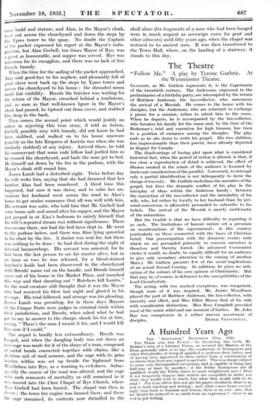The Theatre
"Follow Me." A play by Tyrone Guthrie. At the Westminster Theatre.
GLASGOW, as Mr. Guthrie represents it, is the Capernaum of the twentieth century. The Andersons, engrossed in the
preliminaries of a birthday party, are interrupted by the return of Matthew Anderson, the tax-collector, who announces the arrival of a Messiah. He comes to the house with his disciples, but the Andersons, who are reluctant to exchange a picnic for a mission, refuse to admit him to the room. When he departs, he is accompanied by the tax-collector, who forsakes his family for the cause and, by the time of the Redeemer's trial and execution for high treason, has risen to a position of eminence among the disciples. The play ends as he sits down to write his gospel. His two children, less impressionable than their parent, have already departed in disgust for Canada.
The disadvantage of basing plot upon what is considered historical fact, when the period of action is altered, is that, if too close a reproduction of detail is achieved, the effect of illusion created in the minds of the audience is lessened by irrelevant consideration of the parallel. Conversely, to attempt only a partial identification is not infrequently to incur the charge of travesty. Mr. Guthrie underlines the narrative of the gospel, but fixes the dramatic conflict of his play in the interplay of ideas within the Anderson family ; between the conviction of the tax-collector and the incredulity of his wife, who, led rather by loyalty to her husband than by per- sonal conversion, is ultimately persuaded to subscribe to his beliefs. The arrival of the Messiah is merely emblematic of the miraculous.
But the trouble is that we have difficulty in regarding it as such. The limitations of human nature set a premium on manifestations of the supernatural ; in this country particularly on those connected with the bases of Christian belief. Our preoccupation with the domestic events with which we are persuaded primarily to concern ourselves is therefore and thereby forced. (In advanced Communist circles it would, no doubt, be equally difficult for an audience to give only secondary attention to the coming of another Marx.) Mr. Guthrie presents few of the social implications of an actual Second Coming. In addition, he gives no indi- cation of the colours of his own opinion of Christianity. But that may be, of course, in deference to the susceptibilities of the Lord Chamberlain.
The acting, with two marked exceptions, was competent, though none of it was inspired. Mr. James Woodburn played the part of Matthew Anderson, the tax-collector, with sincerity and effect, and Miss Elliot Mason that of his wife with considerable distinction. Miss Ross Campbell provided most of the comic relief and one moment of bathos. Mr. John Rae was conspicuous in a rather uneven assortment of
































































 Previous page
Previous page